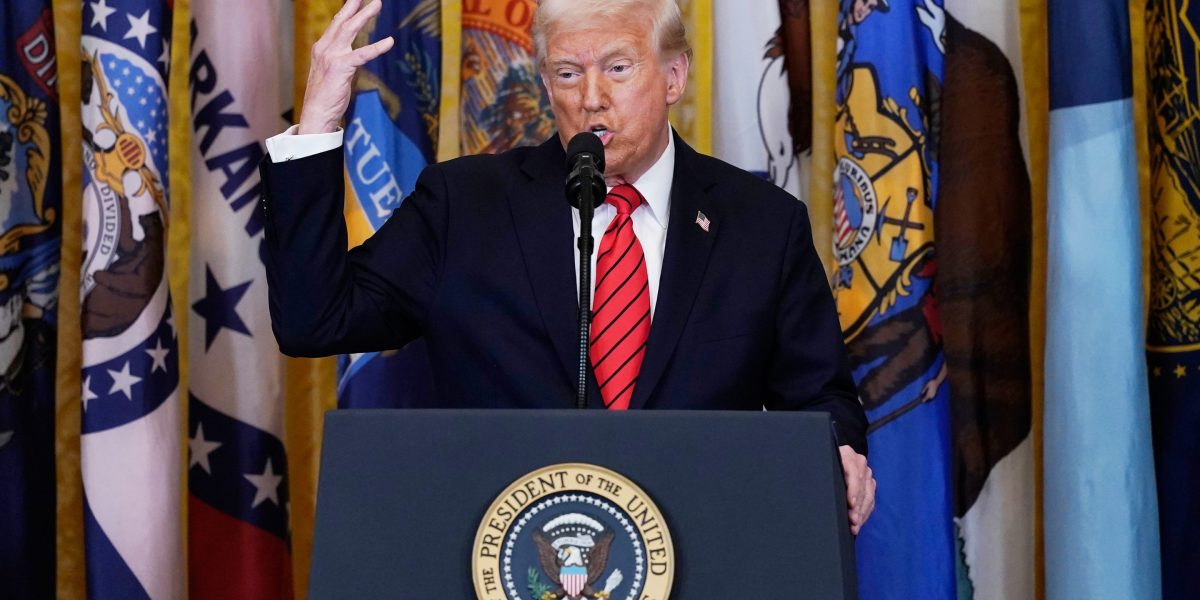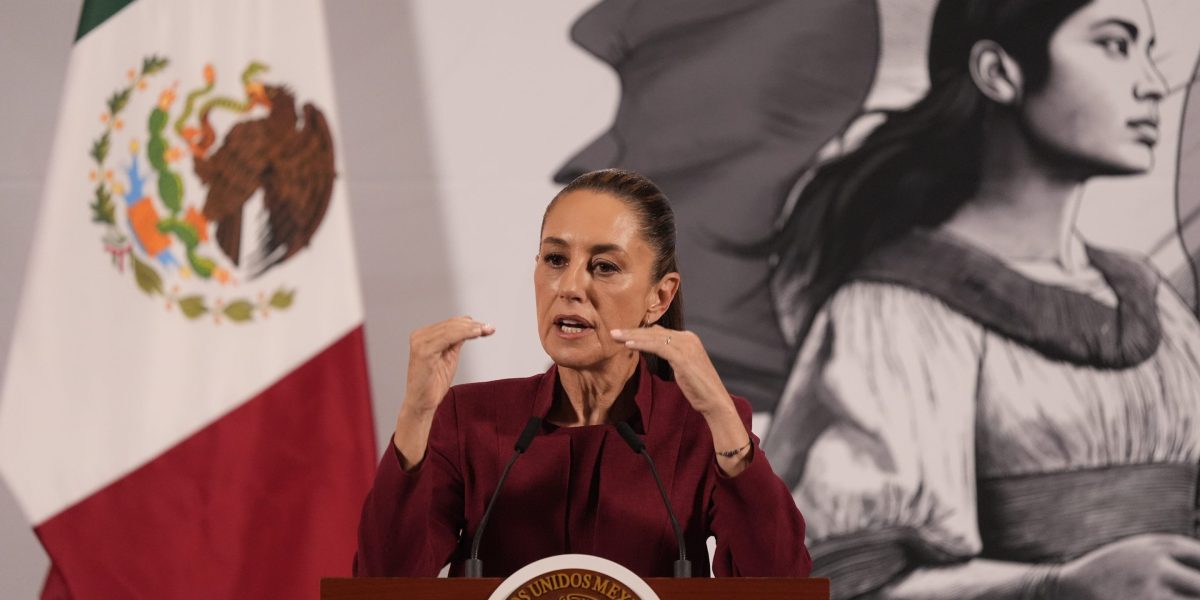A prominent international law firm reached a deal with President Donald Trump on Friday to dedicate at least $100 million in free legal services and to review its hiring practices, averting a punishing executive order like the ones directed at nearly a half-dozen other major legal institutions in recent weeks.
The deal with Skadden, Arps, Slate, Meagher & Flom was announced just hours after two other law firms sued in federal court over executive orders that threatened the suspension of their attorneys’ security clearances and their access to federal buildings. Judges on Friday evening temporarily blocked the enforcement of key parts of the executive orders against those firms, WilmerHale and Jenner & Block.
The contrasting approaches reflect divisions within the legal community on whether to fight or negotiate as Trump seeks to extract major concessions from some of the world’s most significant law firms and in some cases punish them over their association with prosecutors who previously investigated him. Besides Skadden Arps, another firm, Paul Weiss, has reached an agreement with the White House, a deal that prompted major backlash last week from lawyers who said the capitulation set a bad precedent.
In a message to his firm, Skadden Arps executive partner Jeremy London said the firm had recently learned that the Trump administration intended to issue an executive order targeting it over its pro bono legal work and its diversity, equity and inclusion initiatives.
“When faced with this information, we carefully considered what the right path would be for us, and the answer was not obvious. We were thoughtful and deliberate in determining the steps we might take, knowing that the decisions we were grappling with would have fundamental consequences for our firm,” London wrote in the message, which was obtained by The Associated Press.
He added that the firm opted to enter negotiations with the administration in hopes of warding off the issuance of an executive order.
“We entered into the agreement the President announced today because, when faced with the alternatives, it became clear that it was the best path to protect our clients, our people, and our Firm,” he wrote.
As part of the deal, Skadden Arps agreed, among others things, to provide at least $100 million in pro bono legal services related to causes including veterans affairs and countering antisemitism. It also pledged a commitment to merit-based hiring and to use an independent counsel to make sure its employment practices are legal and don’t rely on diversity, equity and inclusion considerations.
The two firms who sued on Friday, Jenner & Block and WilmerHale, argued in their complaints that the orders amount to an unprecedented assault on the legal system and represent an unconstitutional form of presidential retaliation.
“Our Constitution, top to bottom, forbids attempts by the government to punish citizens and lawyers based on the clients they represent, the positions they advocate, the opinions they voice, and the people with whom they associate,” said the complaint from Jenner & Block, filed in federal court in Washington.
After arguments Friday, two different federal judges in Washington granted temporary restraining orders sought by the firms to block enforcement of key portions of the order dealing with access to federal buildings and government contracts. U.S. District Judge Richard Leon, ruling in the case of WilmerHale, said the firm “faces more than economic harm — it faces crippling losses and its very survival is at stake.”
“We appreciate the court’s swift action to preserve our clients’ right to counsel and acknowledgement of the unconstitutional nature of the executive order and its chilling effect on the legal system. The court’s decision to block key provisions of the order vindicates our and our clients’ foundational First Amendment rights,” a WilmerHale spokesperson said in a statement.
The firms argued the executive orders, issued earlier in the week, have already affected their business, with Jenner & Block saying that one client has been notified by the Justice Department that the firm cannot attend an upcoming meeting at the building.
“That client therefore will either need to attend the meeting without outside counsel or would need to retain new outside counsel before April 3,” the lawsuit says.
The WilmerHale complaint raises similar concerns, calling it a flagrant violation of the firm’s rights.
“It imposes severe consequences without notice or any opportunity to be heard; it uses vague, expansive language that does not adequately inform WilmerHale (or its clients) of what conduct triggered these extraordinary sanctions; and it unfairly singles out WilmerHale based on its perceived connections to disfavored individuals and causes,” the lawsuit says.
Targeted law firms have taken different approaches to the executive orders that threaten to upend their business model and chill their legal practice.
Earlier this month, the law firm of Perkins Coie also challenged the Trump order in court and succeeded in getting a judge to temporarily block enforcement. The Paul Weiss firm, by contrast, cut a deal with the White House days after it was subjected to an executive order, with its chairman saying that the order presented an “existential crisis” for the firm and that he wasn’t sure it could have survived a protracted fight with the Trump administration.
The executive order against Jenner & Block this week stemmed from the fact that the firm once employed Andrew Weissmann, a lawyer who served on special counsel Robert Mueller’s team that investigated Trump during his first term in office over potential connections between his 2016 campaign and Russia. Weissmann, a frequent public target of Trump’s ire, left the firm several years ago.
Mueller has retired from WilmerHale, but the White House executive order from Thursday mentions him as well as another retired partner and a current partner who all served on Mueller’s team.
“While most litigation requires discovery to unearth retaliatory motive, the Order makes no secret of its intent to punish WilmerHale for its past and current representations of clients before the Nation’s courts and for its perceived connection to the views that Mr. Mueller expressed as Special Counsel,” the WilmerHale lawsuit says.
The first executive order targeted Covington & Burling, a firm that has provided legal representation to special counsel Jack Smith, who investigated Trump during the Biden administration and filed two separate criminal cases that were abandoned after Trump’s election win last November.
This story was originally featured on Fortune.com
Source link

 Entertainment8 years ago
Entertainment8 years ago
 Politics8 years ago
Politics8 years ago
 Entertainment8 years ago
Entertainment8 years ago
 Entertainment8 years ago
Entertainment8 years ago
 Tech8 years ago
Tech8 years ago
 Tech8 years ago
Tech8 years ago
 Tech8 years ago
Tech8 years ago
 Politics8 years ago
Politics8 years ago







